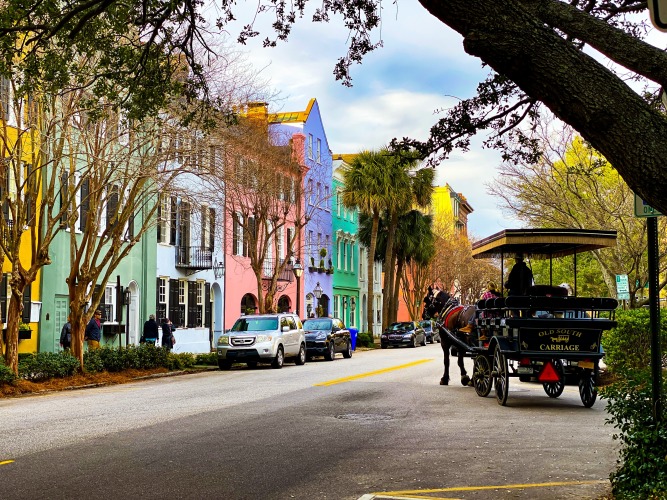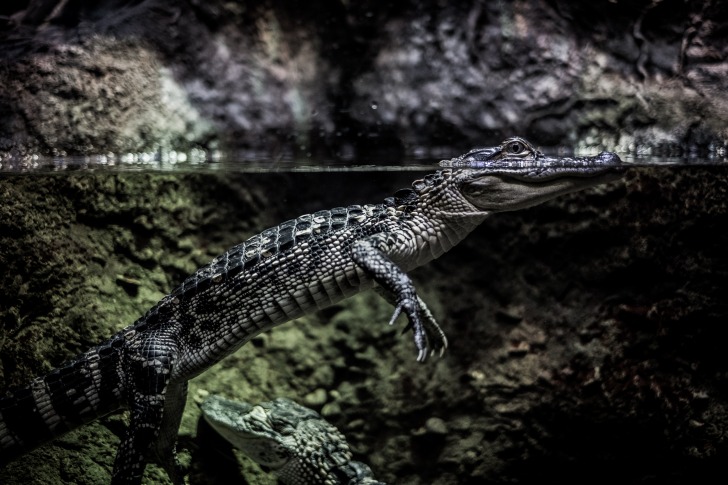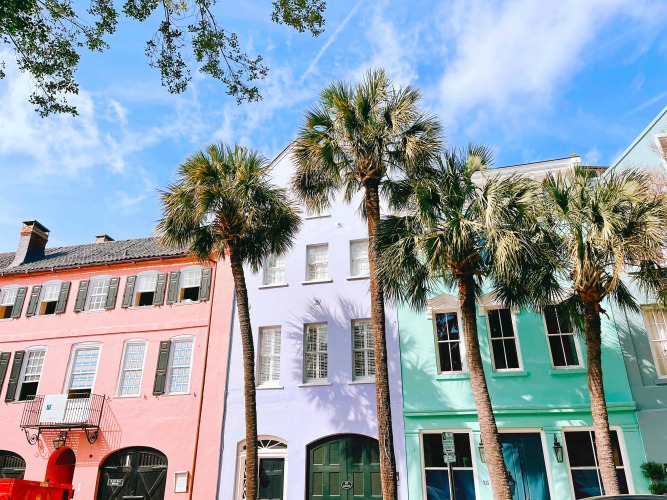Charleston is the oldest city in South Carolina, and one of the oldest in the nation, having been started in 1680.
It is alligator country.
You may not see one roaming the streets today as you might have 340 years ago, but there are a lot of them in the area.
Charleston is a big modern city today, but there’s plenty of habitat for wildlife in the areas around the city.

Contents
So, Are There Alligators in Charleston?
Yes, there are alligators in the Charleston area.
There are an estimated 100,000 alligators in South Carolina living in lowlands and marshy areas.
Alligators like to stay around the rivers, marshes, ponds, and canals around Charleston, and some get very close to populated areas at times.
There are a lot of golf courses around Charleson, and an alligator will visit one from time to time, and be found hanging out in the water or on one of the greens.
Rice was once a major crop in this area, and the terrain was altered during those times.
That created habitat that was great for alligators, and that helped them become even more plentiful.
Even though the area is heavily populated by people now, there are still a lot of wild areas around Charleston, as well as small islands that have very few people.
This is where alligators live.
There is an alligator hunting season in September each year, and the population seems steady.
There are several places to see alligators around Charleston, such as the Audobon Swamp Garden and a tourist attraction called Animal Forest.
The Magnolia Plantation and Gardens are on the banks of the Ashley River, and you can see Gators by taking a boat ride down the river in summer.
Cypress Gardens is a 170-acre preserve just outside Charleston that also houses a lot of alligators.
Daniels Island is a planned community on the edge of Charleston, and it frequently has alligators roaming the streets.
Police are often called to deal with alligators there.
Alligator Species in Charleston
Alligators in the Charleston area are all “American Alligators,” which is the only species that lives in the United States.
There are one other species of alligator, which is smaller and lives in China.
Alligators are part of the crocodilian family but are not crocodiles.
Crocodiles live in hot areas around the world, but not in this area.
Is it Safe to Swim in Charleston?
There are a lot of areas in Charleston where swimming is safe.
Charleson is surrounded by barrier islands, and there are great beaches on Kiawah Island, Folley Veach, Sullivans Island, Isle of Palms, and Seabrook Island.
The Ashley River, which empties into the harbor, is not safe for swimming due to high levels of algae and pollutants.
It is not likely that there are alligators in that area either.
On the beaches, there is the occasional alligator, but alligators tend to stay out of sight if at all possible.
On the beaches, there can be stingrays, jellyfish, and other creatures that can hurt you.
They are usually fairly easy to see and stay away from.
The tides can also be a concern if you are too far out into the water and the tide starts going out.
Currents can also cause you to drift out to sea, so be careful if you are on a floating device.
It is not a good idea to get too far from shore.
There are designated swimming areas that are safe, and that is where you should swim.
There are about 10 drownings per year in the Charleston area, which has more than 1 million people.
There have been people injured by alligators, and even killed, but it is very rare.
South Carolina has averaged about one death per year due to alligators.

Interesting Alligator Facts in Charleston
Charleston does not get very cold in winter, so it is possible to see alligators any time of year around the city.
They are not as active in winter but do not need to go into a brumation state, which is similar to hibernation.
Alligators are most active in spring and that is the breeding season, and that is when they will be most aggressive.
A mother gator will defend her young and it is very dangerous to be near one at that time.
You may see an alligator around the Charleston area, but they are normally not a threat to humans.
Wildlife officials recommend staying 50 feet away from them.
If one does charge you, it is good to run away fast.
They are very fast, for about 50 feet, but they tire quickly and cannot go fast for very long.
There are a lot of resorts and golf courses in the Charleston area.
These include ponds and marshy areas that are prime habitats for alligators.
It is very possible to see an alligator on a golf course.
In 2020, a man lost his arm due to an alligator bite while trying to retrieve a gold ball from a pond.
If you don’t get too close, they are not dangerous though.
If they don’t feel threatened, they will continue to relax in the sun.
In 1843, a newspaper reported that a two-foot-long alligator fell from the sky in a big storm, which could have been a hurricane.
The story said the gator fell from the sky in downtown Charleston and could not have gotten there any other way.
The gator was not harmed and was taken to a swampy area and set free.
Alligators can live up to 60 years.
They tend to eat whatever is available and are able to adjust accordingly.
They eat only once a week or so, and like things like birds, snakes, and small animals.
They have been known to snatch small dogs and eat them.
Alligators store fat in their tail and can go a very long time without eating because of that storage.
Alligators vs. Crocodiles
Alligators are part of the crocodilian family, just as crocodiles are.
They are similar but different species.
There are only two species of alligator.
One of them lives in the southeastern United States and the other one lives in China.
Crocodiles are in tropical areas around the world.
The southern edge of Florida is the only place in the world where alligators and crocodiles live together.
Here are some key differences between alligators and crocodiles.
- Size. Crocodiles are much larger. A crocodile can weigh 2,000 pounds and get up to 20-feet-long, though most are not quite that big. Alligators can get up to 1000 pounds, but most are between 500 and 800 pounds. They tend to be 10 feet long, but some have been found that are longer.
- Color. Alligators are dark grey and appear black in some light. They have a light-colored underbelly. Crocodiles are light brown or light green, and also have a lighter underside.
- Mouths. Alligators have rounded mouths and about 80 teeth. Their teeth grow back when broken or worn down. The shape of the mouth means alligators’ teeth are hidden when they close their mouth. Crocodiles have a set of 66 teeth and they also grow back when lost. Crocodiles have a more pointed mouth, and their teeth are visible when they close their mouth.
- Alligators have webbed feet and they are better swimmers. Crocodiles do not have webbed feet, and while they can swim, they prefer to stay on land.
3 Safety Tips for Swiming in Alligator-infested Waters.
It is not really likely that you will see an alligator while swimming on the beaches near Charleston, but it is possible.
Here are three safety tips to help you have a safe swim.
- Swim only in designated areas. Local officials have made sure certain areas are safe from things like alligators and other creatures. One danger is things you cannot see under the water. This is particularly true for rivers that are not clear and some areas around beaches.
- Don’t swim alone or after dark. Alligators feed at night, and they are very hard to see in the dark. If one is going to bite you, it is more likely to happen at night when they are looking for food. There could also be other creatures lurking at night. Swimming alone is also dangerous because you can easily get in trouble in the water. You need to have someone there just in case.
- Pay attention. Be aware of your surroundings. If you see an alligator or any other creature that could harm you, get away as fast as you can. Alligators can swim very fast, so it is a good idea to get out of the water if there is one you can see. They don’t run fast for long on land but stay far enough away that you have a good running start.
Summary
There are alligators in the wild around Charleston.
The area is a great habitat for these creatures.
Charleston is a big city, and alligators tend to shy away from crowds.
It’s unlikely you will see one in the city, but you can see them easily outside of town.
Charleston Safety Overview
READ THE FULL REPORT: Charleston Safety Review
Safety Index:
- OVERALL RISK: MEDIUM
- TRANSPORT & TAXIS RISK: LOW
- PICKPOCKETS RISK: LOW
- NATURAL DISASTERS RISK: MEDIUM
- MUGGING RISK: LOW
- TERRORISM RISK: MEDIUM
- SCAMS RISK: MEDIUM
- WOMEN TRAVELERS RISK: LOW
Frequently Asked Questions
How strong is an alligator's mouth?
Alligators can bite at 2100 pounds per square inch, which is one of the strongest bites in the animal kingdom.
As a point of reference, humans bite their food at about 150 pounds per square inch.
Crocodiles have the strongest bites in the animal kingdom at 3700 PSI.
Ironically, they do not have strong muscles to open their mouths.
As strong as their bite is, both alligators’ and crocodiles’ mouths can be held shut with one hand.
What do alligators eat?
Adult alligators eat fish, snakes, birds, turtles, and small mammals.
They will eat a small dog, for instance.
It is rare for them to eat a human.
Alligators do not have to eat every day, and because of the stored fat in their tail, they can go a long time without eating if necessary.
Alligators also may not eat as much as you think.
A 1000-pound alligator will eat less over the course of a year than a 100-pound dog will.
Why shouldn't you feed alligators?
Even giving alligators fish scraps is a bad idea.
It will make them associate food with people, and they will start approaching people looking for food.
It will make them bolder in reaching out to people.
Keep in mind that when you clean fish and leave the remains behind, you are in essence leaving food out for the alligators.
Alligators are fun to see, but it is best not to interact with them in any way.
Are alligators endangered?
In the early 60s, they were endangered due to overhunting and were declared an endangered species in 1967.
Wildlife conservation practices, and making killing them illegal, have brought them back to a normal population.
South Carolina now has an open alligator hunting season in September.
Other states also have hunting seasons that are limited.












Charleston, South Carolina is home to a large population of alligators that can be found in the surrounding marshy areas and wildlife habitats, but they are not commonly seen within the city itself.